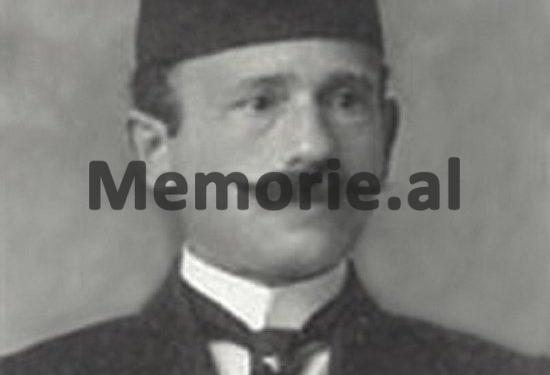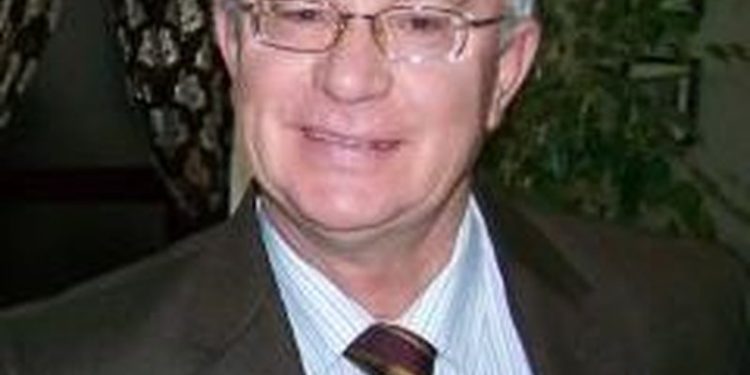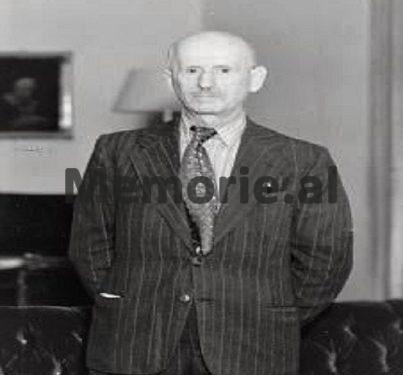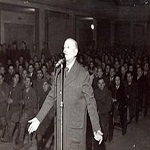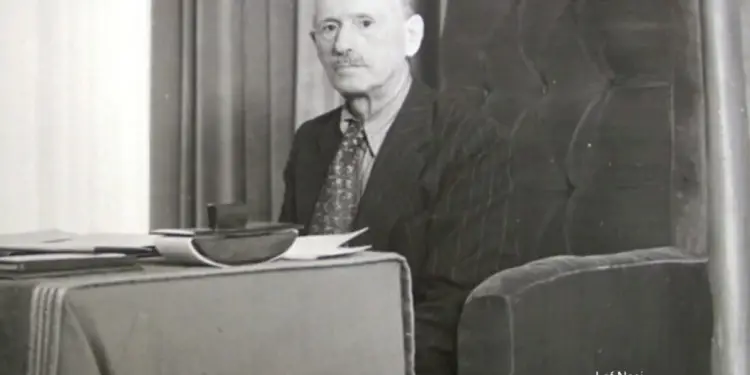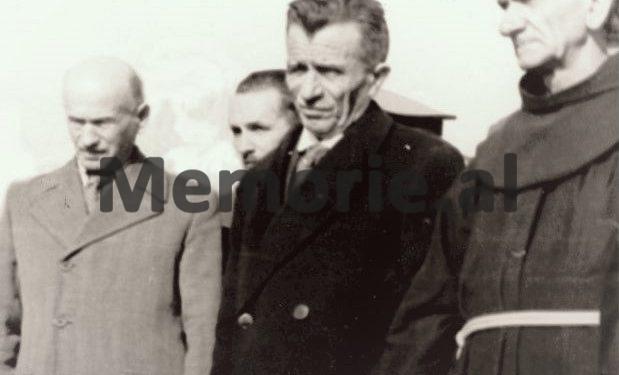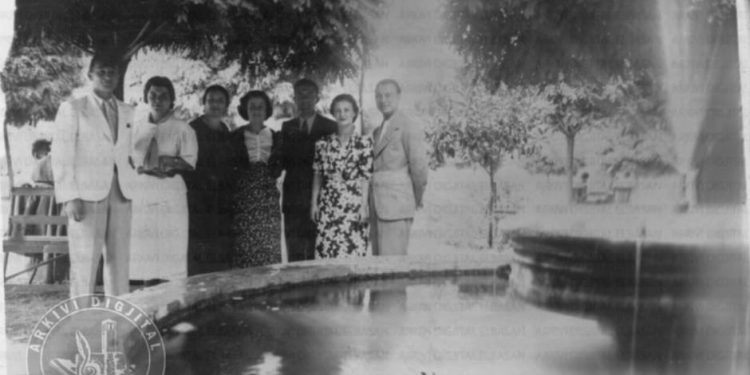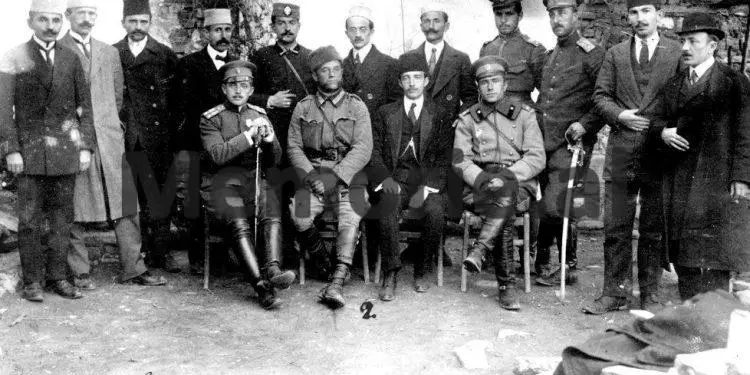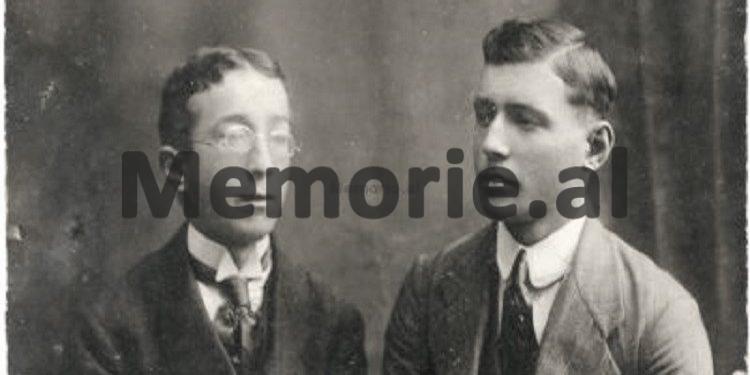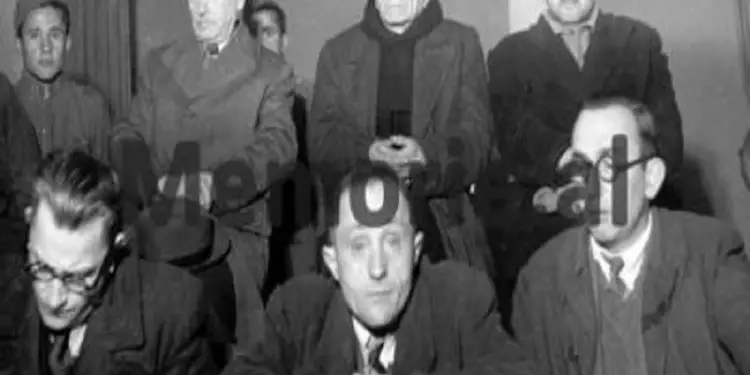By Hyqmet Zane
Memorie.al / The unpublished but also multidimensional portrait of the man who entered the history of the first Albanian state, Lef Nosi, is at the same time the portrait of a man who was recognized by Elbasan and the whole of Albania, but even more than that, who Communism treacherously killed him. He was also recognized by foreign European chancelleries, for the very contributions that this man had as an intellectual, as a statesman, as a humanist, as a philatelist, as a staunch nationalist, but who was defiled, alienated and tried to forget by the Enverist dictatorship. The services that Lef Nosi has done to the nation are engraved in our historical and human memory, they are engraved in the minds of the people of Elbasan and the whole nation, as well as the English, the Germans and even Israel, because of the patriotic services that this man carried out throughout his life, “marrying” the holy ideals of Albanianism, but the servants of the anti-Albanian Slavo-Communism, killed him just because he was a high Albanian.
Adelina, Lef Nosi’s granddaughter, speaks
With these feelings I introduced myself to Mrs. Adelina, the niece (daughter of my brother, Grigori) of this immortal man, not because I want to call him, but because the work he left behind made him so. Although at the age of 92, as the sister of the honorable Dr. Nos, she speaks with pain about the dear man of this great and noble family, as much as it is bad, for what he took away especially at the end of his diplomat life, the academician, the formative state and the great euridite, Lef Nosi. As one of the three regents of Albania, together with the well-known Pater Anton Arapi and Maliq Bushati, Lef Nosi entered Albanian history, on the first day of the new Albanian state, on November 28, 1912, alongside Ismail Qemali, Luigj Gurakuqi, as the minister of Post-Telecommunications.
With a lot of tact and a feminine delicacy, even though at an advanced age, Adelina Kosturi tells in detail and with a brilliant memory those moments, when they entered history as the “Liberation of Albania”, but which became the occupation of the Albanians by the communist plague of primitives. It was the first years after the liberation, when Lef Nosi was found where he was not expected, he hid wherever he could, because the door was open because of the name he had and the reputation he enjoyed in the Albanian public. It was in the highlands of the North of Albania, in those recent times before they arrested and tried him cruelly, the man of Albania’s Independence. Adelina confesses with great concern about Daja, as the people of Elbasana call him, her father’s brother.
“It was one of the people of this area who helped him accommodate him in his house, as soon as he saw and recognized him. One day a man I didn’t know came to our house, knocked on the door and I came out. I didn’t know him, but he told me that in a few hours tonight, Lefi will come to your house. I know he’s gone, I told him. He had stayed with Father Anthony. He came, but I didn’t ask Lefi where he stayed. Xhemal Farka, a friend of Nos at “Robert Kolegj”, prepared Lefi’s departure to the English mission.
For this reason, we bought some wooden works like chibuka, wooden bowls and other carvings and dressed as a peasant, after we bought him a red scarf. We tied all the things with this red scarf and put a cell on his head and with these we went to the Englishman’s mission. We were glad that the English accepted it. He stayed there for 5-6 hours and came back at night. He climbed over the fence of the yard and knocked on the inner door of the house. At that time, we lived in the house of architect Butka, which is still located today on ‘Sulejman Pasha’ street. It is the villa where architect Emin Riza lives. Those railings are still there today as we speak”.
Breathing hard, not only because of her age, but also because of the tension she has when she talks about this event, this honorable lady and from a family with an honorable name even to this day, adds with a sigh that: “I I wondered how you got over the railings, because you were old. I noticed that he was very upset, and he told me that he had had many words with the English. Lefi told me that they had told him that they could not break with the Albanian government. At that time, we had a maid who lived with us. For this reason I hid Daja in a small room where the layers were kept, which communicated with our bedroom. Under these conditions, I called my brother Vasil Nos to come from Elbasan. Vasili came, met Lefi and the next day he returned from Elbasan, together with a loyal friend of our family, Adem Samurri, from Mengli i Elbasan.
Together with Adam, he traveled on foot from Tirana to Elbasan. Among other things, as far as I know, he slept one night at Ahmet Dakli’s house, one night at the Santos family, whose grandchildren he had. He slept at Thanas Floqi’s house and in Labinot, at Samurrë’s. As my brother, Steliano Nosi, told me, he also took refuge in Godolesh and in some other family, which I do not know. At this time Lef was taken care of by my two brothers, Vasili and Steliano, as well as other family friends, some of whom have remained anonymous. They also housed Lef in the Alcohol Factory.
Even my brother, the doctor, told how one morning in those days, when he was visiting, a man known as the State Security came to him, who told Nosi that he should visit him quickly because they had an important job that they would go on an action, to capture a man there from Godolesh. Nosi visited him and immediately took his bike and went to the family where Daja was and told him to leave. Lefi and the others climbed to a high place and after an hour saw that they came, they surrounded the house and found no one. That’s how he escaped.”
Marko Menahemi, Israel’s friend of Nosi’s house
It must be said that in the house of the Noses in Elbasan, a Jew was sheltered; his name was Mark Menahemi, who would go down in the history of this family, as an honorable and loyal man. In a letter that this Israeli sends to the Nosi family, (after 1994) the children of Dr. Nosi, Grigor, Rudi and Vaso, he writes some of the vicissitudes that he and everyone went through in those days before the communists arrested Lef Nosi. Among other things, in this letter, a copy of which was kept by Adelina’s son, Skënder Kosturi, it is said that:
“In June 1944, the Germans were following me because they had received information that I was Israeli. I fled from Cërriku to Elbasan and took shelter, according to the recommendations, in the house of the Nosi family. At first I lived in their house, where Vasil Nosi lived with his wife, his doctor brother, Steliano Nosi, their mother Eleonora, who also became my mother, and from time to time their sister, Adelina Kosturi, came married in Tirana and in the same courtyard lived Lef Nosi, who was one of the three Regents of Albania, in the period September 1943-November 1944.
Later, when the situation became difficult, I moved to the Nosi family’s Alcohol Factory, outside Elbasan, where I had a room and every day someone from the family brought me food. After I was arrested by the German Gestapo, the Nosi family took a lot of trouble, until they rescued me and housed me in their hospital in Llixhat e Elbasan, where they took care of me. After November 29, 1944, when the communists took power, I stayed with the Nos who loved me very much and offered me to stay in Albania and work in the factory. (Mark Menahemi was a specialist engineer in several fields).
Later the trouble started. The Communists were looking for the three Regents who were in charge of the state during the German occupation to sentence them to death. Vasili begged me to hide his uncle Lefin. Vasil Nosi, Steliano and I went to the house of a teacher, Fahrie Averiqi, on “Kavaja” Street in Tirana, with the help of their friend, Xhemal Farka. The goal was to intercede with Nako Spiru, so that Lefi surrendered voluntarily, because, by surrendering voluntarily, he would not be sentenced to death.
“I,” writes Marko, “did not agree and unfortunately my word came out.” But those days Nakoja had run away with service in Moscow. Then Lefi asked to surrender through the grandson of an old friend of his, a prominent figure of our national history. I, – writes Mark Manahemi, – told Vasili that I did not trust this person, since before he took the ranks in the partisan army; he had a dark past with other military forces. Regardless of these doubts, around 9 o’clock in the evening, they should have sent Lefi home to this captain of the partisan army. They put him in the car and, after crossing the bridge that leads to “Elbasani” Street, two young men ran to stop us.
Detouring from the prime minister’s office, to “Durres” Street, we returned Lefi to the teacher’s house. Vasili went himself and contacted the person in question, who calmed them down and told him to bring Lefi home. “I’m waiting for you in the house without lights”. We took out Lefi for the second time. I forwarded it to Mkarko Menahemi. The person in question, remembering that I could be Vasil, said to me: “Don’t worry now Vasil”. But, as Lefi told us in the dungeon, when we came and met him, after half an hour you told him: ‘Lefi, they are looking for you at the gate’, as soon as he opened the gate, they arrested him.
The same evening, Vasil and Steliano Nosi, Xhemal Farka, as well as Marko Menahemi and I were arrested, who, with my passport in my pocket, the next morning, was supposed to leave on a steamer to Israel. We stayed awake on the steamer just to have a dinner with dear friends, Vasil, Steliano and Xhemal, before I finally left Albania. But what I said above happened.” (Actually, Marko Menahemi fled Albania only after the 90s, after he was imprisoned like everyone else).
Arrests of Nos and their friends
It must be said that along with these, Adem Samurri and Fahrije Averiqi were also arrested. At the time when Lefi was arrested, her niece Adelina was not in Tirana, she had gone to Korça. It is known that Anastas Koja, married to a niece of Lefi, took the mattress from the house, loaded it on his back and took it to Lefi’s prison.
Again Adelina, who had already come from Korça, at the time Lefi was put in prison, after 60 years remembers with great precision: “Lefi was imprisoned at ‘Selvia’ on “Dibra” Street (where the Ambulance was of Ward No. 3 in Tirana), in a dungeon under the stairs. Until my return from Korça, Anastas Koja’s family took care of me. Upon my return, after a few days, they took care by sending food and all the things that were needed to the prison, for the 7 detainees who were waiting to appear in court.
At this time, together with other relatives of the family, we tried to make a difference with influential people, as the concern was very great, not only for Lefi’s life, which was prejudiced, but also for the lives of the two brothers of myself and other persons, as the laws and regulations in force at the time provided for a penalty which could be up to death. Then, from there they took them to the Old Prison of Tirana, on “Mine Peza” street.
The last days of Lef Nos
Wanting to remember every moment related to that event that started the series of political punishments from the most monstrous in the history of this country, the niece of Lef Nosi and the sister of Dr. Nosi, Adelina, at that time 31 years old, tells with the pain of a sister for her brother: “On February 12, 1946, the Military Court of Tirana sentenced Lef Nosi to death and to different sentences from 6 to 4 years, for the people who helped him hide. Vasil Nosi, Steliano Nosi, Marko Menahemi, Xhemal Farka, Fahrije Averiqi and Adem Samurri.
When we met her the last time before the shooting, Lefit’s sister, my aunt, Polikseni Dodbiba, also came from Elbasan. We had done it with words so as not to give ourselves away and not to cry in front of Lef. Even Lefi kept himself very well and told us: ‘A man dies once. I left with a clear conscience that I did not commit any crime, I worked for Albania. I am relieved that my sons and friends were not sentenced to death. The boys will do the punishment and get out.’
Later I found out that after he had been separated from us, he had cried. We found out that the director of the prison, Janaq Karapataqi, who was a very humane person and became a friend of our family, told us that Lefi had cried when he was left alone. When he appeared in court, I brought him a suit and a shirt, while he jokingly told me: ‘You will make me your son-in-law’. I want you to go out dressed, I told him.
I also want to remember an episode that left a big impression on me on that dark day, when Daja was shot. Lefi kept a dog at home called ‘Capi’, which was the dog that Fan Noli had left for him when he fled Albania. On the day of the shooting, the dog had been crying since the morning. He himself opened a hole, digging it with his nails, and that day he also died.”
It is already known, but it is necessary to recall that time that sowed only grief, that paved the way for the tragedy of a country that was a pearl of nature, had produced brave men and talented intellectuals, but that was killed by the bullet of the so-called infidelity communist, but which was the black hand of Slavic-communism.
Lef Nosi told this in confidence to Hafuz Musa in Elbasan, when the latter asked him why he was involved in politics, and Lef answered that: “The Chunas are young and they don’t know that the Serbs have tricks.” Thus, these bright figures that honor the Nation that had them, such as: Lef Nosi, Father Anton Arapi and Maliq Bushati, the three Regents for 14 months, according to the agreement, one Muslim, one Orthodox and one Catholic, were shot a few days later, in the hills near Tirana. Actually, there are two versions that either they were killed on the Hill of the Priest, but there is also a version for the Hill of the Bektashian Grandmother.
Again about this time, Adelina, now 92 years old, remembers: “Starting after the shooting, my brother-in-law, Jorgaq Kosturi, who has been dead for many years, took two workers, covered them with soil, because they were buried very shallowly, and placed a jar in Lefi’s feet, to identify him later. This grave has not yet been found. It is also true that the person, who betrayed Lef Nos, was then promoted from captain to major and as far as I know, died in prison or was shot by the conjunctures of the regime that went”.
Other punishments
Vasil Nosi was sentenced to 6 years and died imprisoned in the Alcohol Factory in Elbasan. Dr. Steliano Nosi was sentenced to 4 years for serving as a doctor. He died in 1983. Marko Menahemi was sentenced to 4 years. He spent a year and a half in prison. He then served as a lecturer at the “7 November” Polytechnic, where he made an outstanding contribution to many major projects for the use of the natural mineral reserves of our country. After 1990, his dream of going to his homeland Israel was fulfilled. He died in 2005.
In 1993, the “Jatt Vashem” organization in Israel, as a sign of gratitude for saving Marko Menachem’s life, awarded Dr. To Steliano Nosi, Vasil Nosi and their sister Adelina Kosturi, the high title “Savior of the Israelis”. Their names are engraved on a bronze plaque at the Holocaust Museum in Jatt Vashem as well as in Washington.
Xhemal Farka was sentenced to several years in prison, and then he was sentenced again by firing squad for serving in the Anglo-American military mission.
Farije Averiqi was sentenced to 4 years in prison, served three and then, together with his brother, escaped from Albania and went to a European country. Adem Samuurri was sentenced to 6 years in prison, of which he served 4 of them. He died in his home as a friend of the Nosi family.
Epilogue
In a symposium organized in Elbasan about 12 years ago, a young bride, in her forties, who was married into the Samurre family, said a word that remained in memory. Among other things, she expressed the opinion that: “I have cursed this name Lef Nosi, which you remember today with respect. I cursed him for not confessing the sufferings that our family has gone through, even me as a daughter-in-law, only that my husband’s and father-in-law’s family had sheltered Lef Nos, who I didn’t even know who he was and I didn’t dare to ask.
Except my black fate burned me in this family, just from one name, Lef Nosi. I didn’t know which one it was. But today that I found out in this symposium who this man is and how much good he has done and what a statesman he has been, I have made his suffering halal and I am proud that I am the daughter-in-law of a family that has merit in friendship with a personality such national”.
Perhaps Qemal Stafa, this “Hero of the People” would never have thought of and would never have accepted the tragic end that Lef Nosi, this great man of the Albanian nation had. The three exchanges of letters that Qemali had with Lefi speak of the high esteem that this young man had for the man whom Qemali would like to follow as an example or cooperate with him, wanting to be near this statesman and supply him with books when Lefi was in exile in Italy and Qemali was a student in this country. The suspicious murder of Qemal Stafa seems to have preceded the intentional murder of Lef Nosi and personalities like him who are the living history of the Albanian nation. Memorie.al




